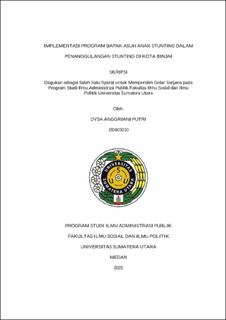Implementasi Program Bapak Asuh Anak Stunting (BAAS) dalam Penanggulangan Stunting di Kota Binjai
Implementation of the Bapak Asuh Anak Stunting (BAAS) Program in Addressing Stunting in Binjai City

Date
2025Author
Putri, Dysa Anggriani
Advisor(s)
Ginting, Wiro Oktavius
Metadata
Show full item recordAbstract
The agenda of developing high-quality human resources is a key pillar in achieving Indonesia’s Golden Vision 2045. One of the major challenges in this development is stunting, a condition of growth failure due to chronic malnutrition and recurring infections during the first 1,000 days of life. In response, the Indonesian government issued Presidential Regulation No. 72 of 2021 targeting a 14% reduction in stunting prevalence by 2024. To support this goal, the National Population and Family Planning Agency (BKKBN) launched the Bapak Asuh Anak Stunting (BAAS) program, which promotes multi-stakeholder involvement to support families at risk of stunting. Binjai City became one of the regions implementing this program in 2023, although the stunting prevalence remains relatively high at 19.4%.
This study aims to describe and analyze the implementation of the BAAS Program in addressing stunting in Binjai City, as well as to identify the challenges faced during its implementation. A descriptive qualitative approach was employed, using George C. Edward III’s policy implementation theory with four key indicators: communication, resources, disposition, and bureaucratic structure. Data were collected through interviews and observations with nine informants, including local government officials from the DPPKB, field officers, prospective brides, and families at risk of stunting.
The findings show that communication within the program was relatively effective, with implementers demonstrating consistent information delivery and clear understanding. However, limited resources—particularly funding—pose challenges in reaching all targeted beneficiaries. Implementers’ disposition was positive, reflected in their initiatives and sense of responsibility, although institutional commitment remains weak due to the absence of adequate regulations and dedicated funding. The bureaucratic structure was relatively organized, with clear roles and SOPs, although cross-agency coordination still needs strengthening. In conclusion, the implementation of the BAAS Program in Binjai City reflects an adaptive and participatory practice, yet requires stronger financial support, regulatory reinforcement, and intersectoral synergy to ensure program sustainability.
Collections
- Undergraduate Theses [1957]
